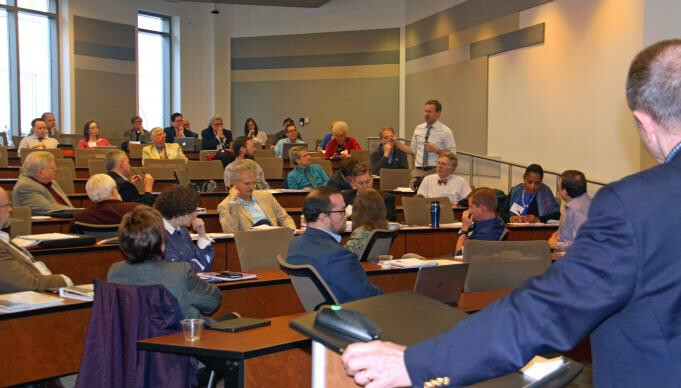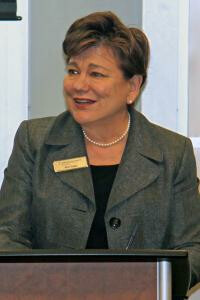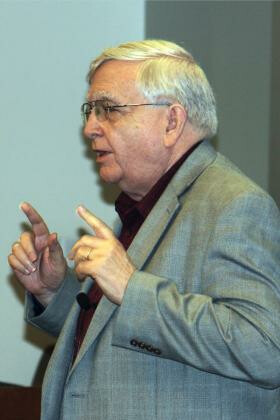Scholars raise doubts about church’s future
By Heather Hahn
United Methodist News Service

Morris L. Davis, a professor of Christian history and Wesleyan studies at Drew University, speaks to a group of United Methodist scholars and other observers at Candler School of Theology in Atlanta. The gathering focused on church unity and the church’s impasse on homosexuality. Photo by Ebony Lincoln, Higher Education and Ministry.
Seminary professors are having their say on how The United Methodist Church should navigate its deep disagreements about the status of gay and lesbian individuals.
However, a number of scholars doubt the denomination can stay united — at least in its current form.
“If you have strong convictions either for or against gay marriage, it seems to me that in a Wesleyan understanding of holiness, saying yes to both in one body is problematic,” said the Rev. Kevin M. Watson. He is a Wesleyan and Methodist Studies professor at Emory University’s Candler School of Theology in Atlanta.
The United Methodist Board of Higher Education and Ministry brought together 28 academics from three countries for a sort of one-time think tank. The title of the March 9-12 gathering at Candler was “Unity of the Church and Human Sexuality: Toward a Faithful United Methodist Witness.”
The Rev. Kim Cape, the agency’s top executive, described the gathering as “an opportunity to demonstrate how people of faith with differing opinions and perspectives can discern God’s way.”

The Rev. Kim Cape, the top executive of the United Methodist Board of Higher Education and Ministry, addresses scholars at the meeting, titled “Unity of the Church and Human Sexuality.” Photo by Ebony Lincoln, Higher Education and Ministry.
The goal was for participants to share their expertise in the Bible, church history, theology
Among the observers of the scholarly conversation were eight members of the Commission on a Way Forward, a group of bishops, other clergy and lay people entrusted with proposing a way through the denomination’s impasse on homosexuality. Other observers included seminary presidents, students
Florida Area Bishop Ken Carter, one of the commission’s moderators, also observed the gathering.
“These professors here represent the intellectual life of our church, and to try to find a way forward within the complexity of unity, division and LGBTQ concerns without drawing upon their work would be absurd,” Carter told United Methodist News Service. LGBTQ stands for lesbian, gay, bisexual, transgender and queer.
The meeting brought together scholars from across the theological spectrum.
They included professors from the 13 United Methodist seminaries in the U.S., Asbury Theological Seminary in Kentucky,
Each participant presented a paper that Higher Education and Ministry will include in a book to be published by the end of the year. The agency also plans to offer a study guide based on the weekend by the end of the month at www.gbhem.org/colloquy.
The conversations were at times passionate, but never rancorous. The academics wrestled with how Methodism dealt with theological divisions and mergers in the past.
They also struggled with how to advise a denomination that now has an openly gay and married bishop — despite its official ban on same-gender unions and the ordination of “self-avowed practicing” gay clergy.
One question the scholars confronted was whether church teachings on homosexuality rank as status
At heart, much of the debate centered on whether a gay person in a committed relationship can lead a sanctified life.
That made sense to Rev. Ted Campbell, church history professor at Southern Methodist University’s Perkins School of Theology. He observed that past Methodist splits have typically come down to disputes on “the shape of a holy life.” That was certainly the case for U.S. Methodism’s 1844 split over slavery.
Even the 1844 separation didn’t end church strife. The dispute over who owned the publishing house eventually landed before the U.S. Supreme Court, and historians have no doubt that Methodists ended up killing fellow Methodists in the U.S. Civil War.
It was clear that many of the professors — regardless of their views — were weary of the current debate.
The Rev. Christopher H. Evans, professor of History of Christianity and Methodist Studies at Boston University School of Theology, told the group that they were dealing with questions he had heard since his seminary days in the 1980s.
“The feeling I have had over the last couple of days that really sums up where we are regardless of where we stand is really one of lament,” he said.
One idea some scholars broached was for the denomination to adopt some form of separation but also coexist in full communion. That would allow the exchange of clergy and some shared mission.
The United Methodist Church already has a full-communion agreement with the Evangelical Lutheran Church in America, which ordains gay clergy. That agreement includes mechanisms so the agreement is not a backdoor for gay clergy to serve in United Methodist churches.
The Rev. Sarah Heaner Lancaster, a veteran in ecumenical talks and professor in the Werner Chair of Theology at Methodist Theological School in Ohio, cautioned that separation wouldn’t necessarily end the debate. Maintaining ecumenical relationships still requires Christians to talk to each other, often about divisive topics.
Not every scholar in attendance was convinced that same-gender relationships should be a deal-breaker for The United Methodist Church.
The Rev. Lisa M. Allen-McLaurin, a professor of liturgy at the Interdenominational Theological Center in Atlanta and a Christian Methodist Episcopal pastor, challenged United Methodists to stay together.
“What I keep hearing is there is no way, but there is a way,” she said. “The way is to say, ‘Maybe I’m not right. Maybe my interpretation is not it exactly. Maybe I need to go down this road a little further with you.’ ”
The Rev. Catherine Kelsey, the dean of the chapel and spiritual formation at Iliff School of Theology, suggested the Way Forward Commission look at the issue of unity a bit differently.
“What if we were to ask: ‘What structures would help us join the mission of God that God wants to do through us in all of our different places?’” Kelsey said.
Reframing the question, she said, takes unity out of the realm of being a problem and into the realm of possibility.
The Way Forward Commission, which has met twice, is already considering possible structural changes to reshape how the denomination operates. However, it is too soon to say what those structures might look like.
Alice Williams, a lay member on the commission who is a lesbian, said she was impressed with the depth of thought the scholars brought to the discussion.
“I think it helped us to be faithful to our call,” she told UMNS.
Dave Nuckols, a fellow commission member, said commission members learned that “dividing is easy to do but pretty much impossible to do well.”
“Staying united is hard, but it’s possible if you are really committed to being the church together,” he said. “We have a history of division, but I don’t think that our history is our destiny.”
Hahn is a multimedia news reporter for United Methodist News Service. Contact her at (615) 742-5470 or . To read more United Methodist news, subscribe to the free Daily or Weekly Digests.

